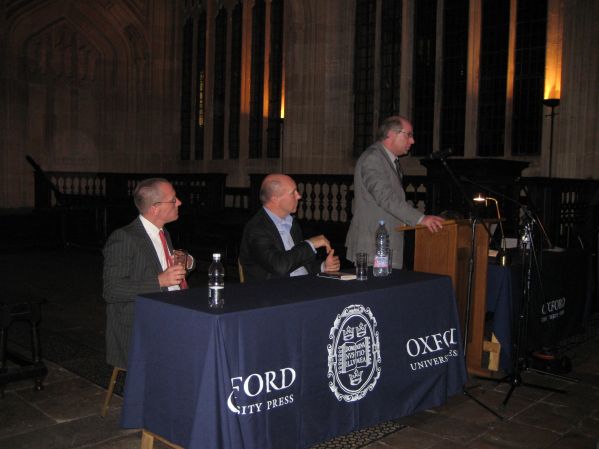 Oxford English Dictionary chief editor John Simpson has decided to retire in October 2013.
Oxford English Dictionary chief editor John Simpson has decided to retire in October 2013.
Simpson has been a member of the editorial staff at the celebrated dictionary since 1976. He assumed the chief editor post in 1993, only the seventh editor to hold that prestigious post since 1879. During his time at the post, a staggering 60,000 new words and meanings have been added to the dictionary.
Editorial project director Michael Proffitt will assume the chief editor post in November. Principal etymologist Philip Durkin will serve as deputy chief editor alongside current deputy chief editor Edmund Weiner.
continued…
New Career Opportunities Daily: The best jobs in media.
One of the most prized, and most difficult, tasks a new author undertakes is the quest to find his own voice. It is a desire to be unique and original, to sound like no one else. Because voice has to do with sound, right? Voice is the sound we make out loud. But then, what [...]
By Kirsty McHugh, OUP UK
Last night saw the OED 80th Anniversary celebrations culminate in a public panel discussion on  ‘The Oxford English Dictionary: Past, Present, and Future’ at the incredibly beautiful and historic Bodleian Library in Oxford.
‘The Oxford English Dictionary: Past, Present, and Future’ at the incredibly beautiful and historic Bodleian Library in Oxford.
On the panel was OED chief editor John Simpson, historian and author of The Meaning of Everything: The Story of the Oxford English Dictionary Simon Winchester, and Ammon Shea, who wrote Reading the OED and who of course needs no introduction to OUPblog readers.
Simon Winchester opened up proceedings with a history of dictionaries, telling us that 1604 saw the first modern  dictionary as we understand them today. In that case, it was a slim book written by Robert Cawdrey called A table alphabeticall conteyning and teaching the true writing, and vnderstanding of hard vsuall English wordes, borrowed from the Hebrew, Greeke, Latine, or French, &c. With the interpretation thereof by plaine English words, gathered for the benefit & helpe of ladies, gentlewomen, or any other vnskilfull persons. Whereby they may the more easilie and better vnderstand many hard English wordes, vvhich they shall heare or read in scriptures, sermons, or elswhere, and also be made able to vse the same aptly themselues. Snappy, huh?
dictionary as we understand them today. In that case, it was a slim book written by Robert Cawdrey called A table alphabeticall conteyning and teaching the true writing, and vnderstanding of hard vsuall English wordes, borrowed from the Hebrew, Greeke, Latine, or French, &c. With the interpretation thereof by plaine English words, gathered for the benefit & helpe of ladies, gentlewomen, or any other vnskilfull persons. Whereby they may the more easilie and better vnderstand many hard English wordes, vvhich they shall heare or read in scriptures, sermons, or elswhere, and also be made able to vse the same aptly themselues. Snappy, huh?
He then went on to talk about arguably the most famous dictionary (other than the OED obviously!): that by Samuel Johnson. Johnson was known as a bit of a cantankerous fellow, and this sometimes filtered down into his definitions. For example, his famous definition of ‘oats’:
A grain, which in England is generally given to horses, but in Scotland appears to support the people.
I won’t take offence, promise. Then we heard about the famous OED editors of the late 19th and early 20th century: Herbert Coleridge, Frederick Furnivall (who had to leave the job after it was realised that he was more interested in sculling and well-endowed young ladies), and, of course, James Murray.
John Simpson, today’s OED editor, took us through what happens to an entry and the kinds of information that is needed for the Dictionary. He used the example of ‘lifeboat’ and took us through its history from its first appearance in the first edition of the OED , to moving from being hyphenated (life-boat) to a solid word in 1903, up to the latest evidence of its earliest usage, which will be in the updated entry to go online soon.
Then, to finish the evening, Ammon Shea told us all about reading the OED from A-Z in one year. To read more about the many wonderful words he discovered during that year, then do read his past posts for OUPblog. But I couldn’t agree with him more when he said that there is much emotional content within the Oxford English Dictionary: the poignancy of a word that means ‘to no longer own something, but to wish that you still did’, or a word that means ‘the sound of leaves rustling in the wind’. The OED is, as Ammon said, a “remarkable creature of literature”, which is why I am so happy to have been here for the 80th anniversary celebrations.
Here’s to another 80 years, and many, many more.
ShareThis
 Oxford English Dictionary chief editor John Simpson has decided to retire in October 2013.
Oxford English Dictionary chief editor John Simpson has decided to retire in October 2013.



